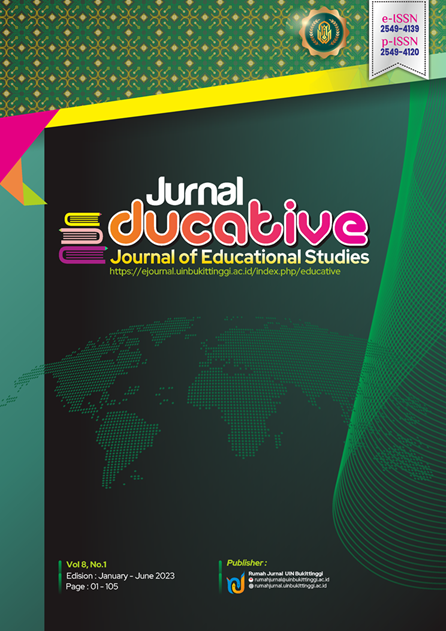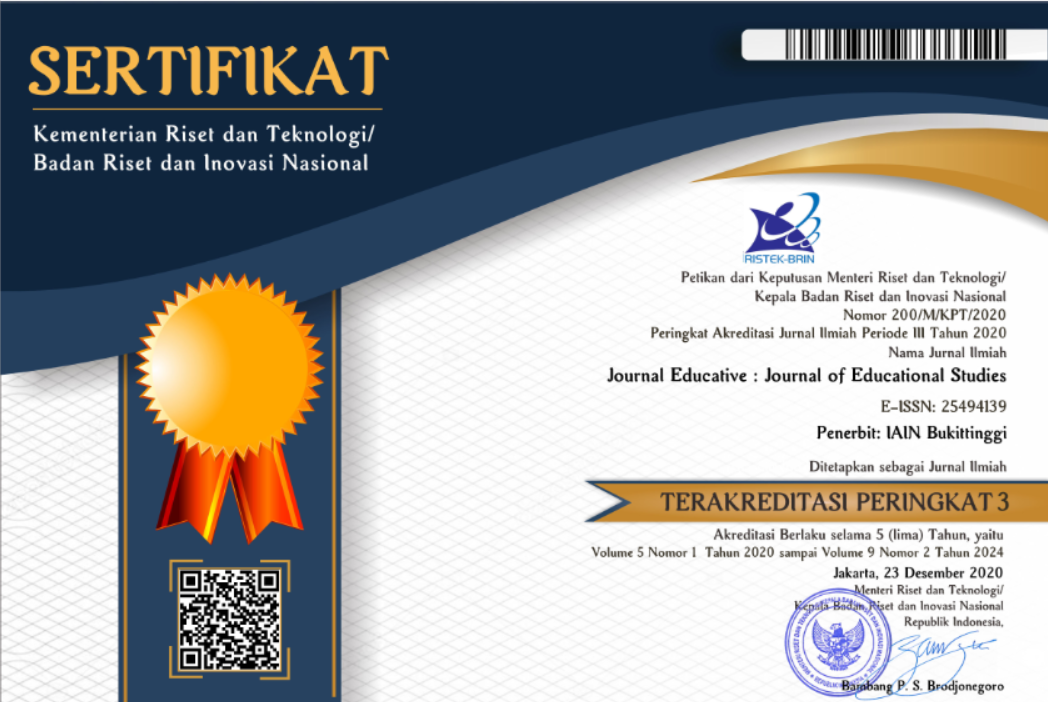Exploring the Multifaceted Roles of Non-Native English-Speaking Teachers (NNEST) in Enhancing participants' Speaking Proficiency
DOI:
https://doi.org/10.30983/educative.v8i1.6279Keywords:
Non-Native English Speaking Teacher, NNESTs, Speaking, Speaking skillAbstract
References
Journal
Abramova, I. E., & Makarova, E. N. (2020). Transformation of the foreign language teacher’s role in regional university: Comparative analysis of teachers’ subjective well-being. Perspektivy Nauki i Obrazovania, 43(2). https://doi.org/10.32744/pse.2020.2.33
Aghaei, P., Bavali, M., & Behjat, F. (2020). An in-depth qualitative study of teachers’ role identities: A case of Iranian EFL teachers. International Journal of Instruction, 13(2). https://doi.org/10.29333/iji.2020.13241a
Ati, A., & Parmawati, A. (2022). The Use of Oral Presentation In Teaching English to Improve Participants Speaking Skill. PROJECT (Professional Journal of English Education), 5(2). https://doi.org/10.22460/project.v5i2.p300-305
Bajrami, L. (2015). Teacher’s New Role in Language Learning and in Promoting Learner Autonomy. Procedia - Social and Behavioral Sciences, 199. https://doi.org/10.1016/j.sbspro.2015.07.528
Catelly, Y. M. (2011). The foreign language teacher’s roles in response to the knowledge society requirements. Procedia - Social and Behavioral Sciences, 11. https://doi.org/10.1016/j.sbspro.2011.01.047
Ellis, R., & Shintani, N. (2013). Exploring language pedagogy through second language acquisition research. In Exploring Language Pedagogy through Second Language Acquisition Research. https://doi.org/10.4324/9780203796580
Fauzi, N. M., & Hashim, H. (2020). Apple vs. Mangosteen: A qualitative study of participants’ perception towards native and non-native English-speaking teachers. Journal of Education and E-Learning Research, 7(2). https://doi.org/10.20448/JOURNAL.509.2020.72.218.228
Gurkan, S., & Yuksel, D. (2012). Evaluating the Contributions of Native and Non-Native Teachers to an English Language Teaching Program. Procedia - Social and Behavioral Sciences, 46. https://doi.org/10.1016/j.sbspro.2012.05.596
Haque, M. N., & Sharmin, S. (2022). Perception of Saudi participants About Non-Native English Teachers and Native English Teachers in Teaching English at Jazan University. Journal of Language Teaching and Research, 13(3). https://doi.org/10.17507/jltr.1303.06
Herlina, L., & Said, M. (2022). The Role of Native English-Speaking Teachers in Improving participants’ Speaking Skills. Advances in Social Sciences Research Journal, 9(12). https://doi.org/10.14738/assrj.912.13588
Housen, A., & Kuiken, F. (2009). Complexity, accuracy, and fluency in second language acquisition. Applied Linguistics, 30(4). https://doi.org/10.1093/applin/amp048
How to Use Oral Presentations to Help English Language Learners Succeed | KQED. (n.d.). Retrieved May2, 2023, from https://www.kqed.org/mindshift/50918/how-to-use-oral-presentations-to-help-english-language-learners-succeed
Iqram, M., & Student’s Id, H. (2015). Teaching Productive Skills to the participants: A Secondary Level Scenario.
Linarsih, A. (2013). Culture, Religion, And English Teachers’ Contribution In Indonesia. Al-Albab, 2(2). https://doi.org/10.24260/alalbab.v2i2.42
Moussu, L., & Llurda, E. (2008). Non-native English-speaking English language teachers: History and research. Language Teaching, 41(3), 315-348.
Naibaho, L. (2019). Teachers’ Roles on English Language Teaching: A Participants Centered Learning Approach. International Journal of Research -GRANTHAALAYAH, 7(4). https://doi.org/10.29121/granthaalayah.v7.i4.2019.892
Nagy, T. (2021). Using Technology for Foreign Language Learning: The Teacher’s Role. Central European Journal of Educational Research, 3(2). https://doi.org/10.37441/cejer/2021/3/2/9347
Nurchalis, N. F. (2020). Demands of English teacher competencies: Input for curriculum development at the University. EnJourMe (English Journal of Merdeka) : Culture, Language, and Teaching of English, 5(2). https://doi.org/10.26905/enjourme.v5i2.4971
Ohta, A. S. (2001). Second Language Acquisition Processes in the Classroom. In Second Language Acquisition Processes in the Classroom. https://doi.org/10.4324/9781410604712
PodgorÅ¡ek, S., StarÄiÄ, A. I., & Kacjan, B. (2019). The foreign language teacher’s role in ICT-supported instruction. Sodobna Pedagogika/Journal of Contemporary Educational Studies , 70(1).
Storch, N. (2002). Patterns of interaction in ESL pair work. Language Learning, 52(1). https://doi.org/10.1111/1467-9922.00179
Roberts, C. A., & Wright, T. (1988). Roles of Teachers and Learners. TESOL Quarterly, 22(3). https://doi.org/10.2307/3587291
Swain, M., & Lapkin, S. (2000). Task-based second language learning: The uses of the first language. Language Teaching Research, 4(3). https://doi.org/10.1177/136216880000400304
Umar, U. (2021). The Important Roles of Teachers In English Language Teaching (ELT). Journal of English Language and Literature (JELL), 6(1). https://doi.org/10.37110/jell.v6i1.117
Tosuncuoglu, Ä°. (2017). Non-Native & Native English Teachers. Journal of History Culture and Art Research, 6(6). https://doi.org/10.7596/taksad.v6i6.573
Wang, L., & Fang, F. (2020). Native-speakerism policy in English language teaching revisited: Chinese university teachers’ and participants’ attitudes towards native and non-native English-speaking teachers. Cogent Education, 7(1). https://doi.org/10.1080/2331186X.2020.1778374
Yasmin, F., & Islam, M. (2018). Academic Roles of English Language Teachers: A Study of the Perceptions of Pakistani Teachers and participants. Journal of Foreign Languages, Cultures and Civilizations, 6(1). https://doi.org/10.15640/jflcc.v6n1a2
Downloads
Published
How to Cite
Issue
Section
Citation Check
License
Copyright (c) 2023 Gusti Milla Milla Quaidy, Zamratul Khairani, Ernest Isakov, Abdurrahman Kalambekov

This work is licensed under a Creative Commons Attribution-ShareAlike 4.0 International License.
Authors who publish with this journal agree to the following terms:
1. Authors retain copyright and grant the journal right of first publication with the work simultaneously licensed under a Creative Commons Attribution License that allows others to share the work with an acknowledgment of the work's authorship and initial publication in this journal.
2. Authors are able to enter into separate, additional contractual arrangements for the non-exclusive distribution of the journal's published version of the work (e.g., post it to an institutional repository or publish it in a book), with an acknowledgment of its initial publication in this journal.
3. Authors are permitted and encouraged to post their work online (e.g., in institutional repositories or on their website) prior to and during the submission process, as it can lead to productive exchanges, as well as earlier and greater citation of published work (See The Effect of Open Access).




